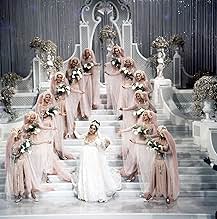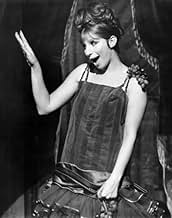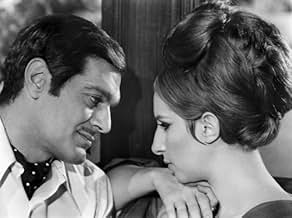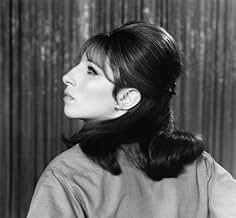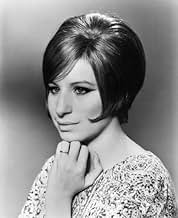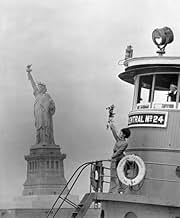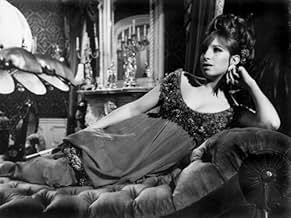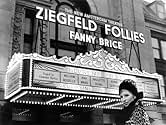VALUTAZIONE IMDb
7,4/10
26.508
LA TUA VALUTAZIONE
Segui la vita di Fanny Brice, famosa comica e intrattenitrice dei primi anni del 1900, la sua ascesa alla fama come ragazza Ziegfeld, la sua successiva carriera e la sua vita personale, in p... Leggi tuttoSegui la vita di Fanny Brice, famosa comica e intrattenitrice dei primi anni del 1900, la sua ascesa alla fama come ragazza Ziegfeld, la sua successiva carriera e la sua vita personale, in particolare il suo rapporto con Nick Arnstein.Segui la vita di Fanny Brice, famosa comica e intrattenitrice dei primi anni del 1900, la sua ascesa alla fama come ragazza Ziegfeld, la sua successiva carriera e la sua vita personale, in particolare il suo rapporto con Nick Arnstein.
- Vincitore di 1 Oscar
- 8 vittorie e 16 candidature totali
Karen Stride
- Ziegfeld Girl
- (as Karen Lee)
Recensioni in evidenza
Barbra Streisand made one the biggest debuts in the history of films playing Fanny Brice in Funny Girl. She also won an Oscar as best actress of 1967 for her efforts. Although this musical bogs down a bit in the second half, Streisand keeps the viewer glued to the screen with her brilliant portrayal of this great star. Terrific musical numbers come one after another, and Streisand shifts gears effortlessly between comic gems like "I'm the Greatest Star" and "The Roller Skate Rag" and signature tunes like "People" and "Don't Rain on My Parade." Her closing rendition of "My Man" is very effective (and was copied by Diana Ross in Lady Sings the Blues). Big and bright and splashy, Funny Girl is one of the last great, old-style musicals produced in Hollywood. Omar Sharif, Walter Pidgeon, Anne Francis, Kay Medford, Mae Questel, Frank Faylen, and Lee Allen co-star. Meford won a supporting Oscar nomination as the mother. Pidgeon should have been nominated for his role as Flo Ziegfeld. And I think Questel is a scream as the local yenta. But the center of this film is Streisand. Every number is a gem, and she looks great. There may be better musicals, but you'd be hard pressed to name a better performance in a musical than Barbra Streisand playing Fanny Brice in Funny Girl.
Others in the cast include Gertrude Flynn and Penny Santon as the card players, Tommy Rall as the prince in the ballet sequence, Mittie Lawrence as the maid, Gerald Mohr as the gangster, Inga Neilsen and Bettina Brenna as show girls, and Elaine Joyce in the roller skating number.
Others in the cast include Gertrude Flynn and Penny Santon as the card players, Tommy Rall as the prince in the ballet sequence, Mittie Lawrence as the maid, Gerald Mohr as the gangster, Inga Neilsen and Bettina Brenna as show girls, and Elaine Joyce in the roller skating number.
I've seen this film many times,and I've always thought it was one of Barbra Streisand's best films because it allowed her to use her strengths as a comedian, singer, and dramatic actor. It's clear that her presence dominates the movie; however, there are some excellent supporting players, including Kay Medford as Fanny Brice's mother Rose and Walter Pigeon as Florenz Ziegfeld, two very fine character actors. Rose is particularly likable because, unlike her daughter Fanny, she sees things as they are and not the way they should be. This applies to her comment about Nick Arnstein, the handsome gambler that Fanny marries, despite the fact that Rose perceives him to be a "sponge."
Fanny, as shown in this film, is also very likable not only because of her humor but for her generosity and thoughtfulness. Her ambition, of course, is to conquer the stage and she does so fairly quickly after making a great mess of a roller skate number at the local dance hall. Before long, Fanny is auditioning for Ziegfeld, the famous impressario and she wins him over with her talent and charm. Nick Arnstein, a man about town, always seems to be around Fanny when she triumphs on the stage and this time is no different. He buys her a beautiful bouquet of roses with a note, "Dear Star, I told you so." Very soon, Fanny and Nick become involved in a relationship which is often on and off until Fanny literally proposes to him. What follows is a heartbreaking story of a young woman whose desire to be loved for herself alone and her passion for a happy domestic life is thwarted by fate and some wrong choices.
After a montage of the first year of their marriage together, problems start affecting the Arnstein marriage. It is true that they are wealthy people; however, their problems aren't minor. Nick begins to lose heavily at the gaming table and everything he tries ends in failure. Fanny, on the other hand, continues to be successful on the stage and Nick starts to resent her. Suddenly, all of his gentlemanly charm and good manners disappear as if by magic; he's rude to Fanny, making her upset over things that a truly married couple would find a way to resolve. Indeed, he starts ignoring her deliberately and places his interests and needs above hers. After a while, the marriage collapses not because of Fanny's career but the way in which Nick looks at their relationship (we discover this near the end of the film.) He also conceals his financial problems from her, shutting Fanny out of his life as though she didn't exist.
All of this culminates in Nick's unfortunate involvement in a shady bond scheme which sends him to prison for two years. I would say that these problems are rather huge. I don't want to give more away because I feel others should have the opportunity to see the film and judge for themselves. But I have to say that the ending of the movie, is, in my opinion, one of the most heartfelt, dignified, and classiest moments ever put on film. And Barbra Streisand makes the most of it, touching us not only with her excellent performance of the song "My Man" but also by the way her Fanny carries herself, taking responsibility for her choice and showing that she will go on with her life, despite what's happened to her.
Fanny, as shown in this film, is also very likable not only because of her humor but for her generosity and thoughtfulness. Her ambition, of course, is to conquer the stage and she does so fairly quickly after making a great mess of a roller skate number at the local dance hall. Before long, Fanny is auditioning for Ziegfeld, the famous impressario and she wins him over with her talent and charm. Nick Arnstein, a man about town, always seems to be around Fanny when she triumphs on the stage and this time is no different. He buys her a beautiful bouquet of roses with a note, "Dear Star, I told you so." Very soon, Fanny and Nick become involved in a relationship which is often on and off until Fanny literally proposes to him. What follows is a heartbreaking story of a young woman whose desire to be loved for herself alone and her passion for a happy domestic life is thwarted by fate and some wrong choices.
After a montage of the first year of their marriage together, problems start affecting the Arnstein marriage. It is true that they are wealthy people; however, their problems aren't minor. Nick begins to lose heavily at the gaming table and everything he tries ends in failure. Fanny, on the other hand, continues to be successful on the stage and Nick starts to resent her. Suddenly, all of his gentlemanly charm and good manners disappear as if by magic; he's rude to Fanny, making her upset over things that a truly married couple would find a way to resolve. Indeed, he starts ignoring her deliberately and places his interests and needs above hers. After a while, the marriage collapses not because of Fanny's career but the way in which Nick looks at their relationship (we discover this near the end of the film.) He also conceals his financial problems from her, shutting Fanny out of his life as though she didn't exist.
All of this culminates in Nick's unfortunate involvement in a shady bond scheme which sends him to prison for two years. I would say that these problems are rather huge. I don't want to give more away because I feel others should have the opportunity to see the film and judge for themselves. But I have to say that the ending of the movie, is, in my opinion, one of the most heartfelt, dignified, and classiest moments ever put on film. And Barbra Streisand makes the most of it, touching us not only with her excellent performance of the song "My Man" but also by the way her Fanny carries herself, taking responsibility for her choice and showing that she will go on with her life, despite what's happened to her.
...Perhaps not. But for nearly 2 1/2 hours in "Funny Girl," Barbra Streisand at least makes a convincing case for herself.
Forget about the television airings you've seen. Throw away your old video cassette copy. Instead, see the restored, widescreen, road show version now in limited theatrical release. It is the ONLY way to truly appreciate the talents of Ms. Streisand and, more notably, the film's brilliant director, William Wyler.
Movies today no longer look like movies. The highest compliment one can pay "Funny Girl" is that it is a grand, glorious MOVIE in the truest sense. Wyler's brilliance is never more evident than in his glorious treatment of the "Don't Rain on My Parade" sequence, the stunning camerawork of "The Swan," and the incredibly effective set-up of the "My Man" finale.
Ms. Streisand doesn't really give a performance; she simply is Barbra. Every "Barbra-ism" that we have come to know, love and hate over the years is already crystallized at this point. Her brashness can be off-putting, but by the end of the movie, one is completely won over by the sheer enormity of her talent and presence. Yes, you can see the beginnings of the blind egomania that has marred her performances for the last 20-odd years (to be generous); but you cannot deny her brilliance, either. And to see her extraordinary face in full-screen close up is breathtaking. Kudos to the director, lighting director, and make-up artist for making Streisand appear so wonderful in this.
From the sweepingly orchestrated titles to the high-drama impact of the showstopping finale, this is Entertainment with a capital E. About 20 minutes could have been trimmed, and exactly why Omar Sharif was cast remains a mystery; but at the end of the picture, these quibbles are trivial. Did I laugh? Yes. Did I cry? Yes. Was I thrilled, excited, entertained? You betcha.
Forget about the television airings you've seen. Throw away your old video cassette copy. Instead, see the restored, widescreen, road show version now in limited theatrical release. It is the ONLY way to truly appreciate the talents of Ms. Streisand and, more notably, the film's brilliant director, William Wyler.
Movies today no longer look like movies. The highest compliment one can pay "Funny Girl" is that it is a grand, glorious MOVIE in the truest sense. Wyler's brilliance is never more evident than in his glorious treatment of the "Don't Rain on My Parade" sequence, the stunning camerawork of "The Swan," and the incredibly effective set-up of the "My Man" finale.
Ms. Streisand doesn't really give a performance; she simply is Barbra. Every "Barbra-ism" that we have come to know, love and hate over the years is already crystallized at this point. Her brashness can be off-putting, but by the end of the movie, one is completely won over by the sheer enormity of her talent and presence. Yes, you can see the beginnings of the blind egomania that has marred her performances for the last 20-odd years (to be generous); but you cannot deny her brilliance, either. And to see her extraordinary face in full-screen close up is breathtaking. Kudos to the director, lighting director, and make-up artist for making Streisand appear so wonderful in this.
From the sweepingly orchestrated titles to the high-drama impact of the showstopping finale, this is Entertainment with a capital E. About 20 minutes could have been trimmed, and exactly why Omar Sharif was cast remains a mystery; but at the end of the picture, these quibbles are trivial. Did I laugh? Yes. Did I cry? Yes. Was I thrilled, excited, entertained? You betcha.
Wow, was Barbra ever great in this one! The delivery of the songs, in which she often gets so intoxicated with the great music and lyrics that she starts swaying. The acting, which certainly is none too bad, either. The sheer beauty of her performance is indescribable. Really, I am not exaggerating. She is radiant in just about every frame of the film that she appears in; she practically glows! She is gorgeous, she really is! You cannot help but love this kid from the moment she steps onto the screen. She is funny, she is touching, she is electric, she is wonderful, and she is so many other things.
Omar Sharif certainly is suave as her leading man (And you know exactly how he feels, because you love her, too!), and Kay Medford is also good as her mother. William Wyler's direction is right on the money. And those costumes and sets! But, of course, the film belongs to Barbra. It may drag quite a bit near the end, but she pulls it through. This was her first film, before the egomania, (evident in only her second film, Hello, Dolly!), before the sappy stuff. This was made when she was a fresh young talent who had "so much to offer." And boy, did she deliver the goods in this one! If you see this, you can certainly consider yourself one of the luckiest people in the world.
Omar Sharif certainly is suave as her leading man (And you know exactly how he feels, because you love her, too!), and Kay Medford is also good as her mother. William Wyler's direction is right on the money. And those costumes and sets! But, of course, the film belongs to Barbra. It may drag quite a bit near the end, but she pulls it through. This was her first film, before the egomania, (evident in only her second film, Hello, Dolly!), before the sappy stuff. This was made when she was a fresh young talent who had "so much to offer." And boy, did she deliver the goods in this one! If you see this, you can certainly consider yourself one of the luckiest people in the world.
There are two important things to remember about Funny Girl when writing about it or discussing it. The first is Nicky Arnstein was still alive in 1964 when it debuted on Broadway, he died the following year. The second is that Ray Stark, the producer of Funny Girl on stage and on the screen is the son-in-law of Fanny Brice and Nicky Arnstein. So off the bat you know you're going to get a sanitized version.
Not that what they created was bad, how could it be for giving Barbra Streisand the role that made her a star on both stage and screen. Fanny Brice didn't do too bad out of it either, unlike a lot of her contemporaries she lives on through the artistry and interpretation of an icon in a future age.
But was Fanny's story ever given the literary dry process cleaning. Eliminated was her brief marriage to a first husband. Changed is the fact that she knew exactly who at what Arnstein was before she married him. Arnstein was a big time con artist who had no shame whatsoever in using his famous wife's name as a come on. Fanny herself though was never involved in any of his schemes. Arnstein did in fact take the fall and never squealed on any of the ones behind him who certainly were more than capable of reprisals against him and possibly against Fanny Brice.
Jule Styne and Bob Merrill wrote the original songs for the Broadway score and added one song, Funny Girl, for the film. But still the two standouts are Barbra Streisand's classic People and Don't Rain On My Parade, a couple of standards she's made almost exclusively her own. I don't think anyone else would attempt to sing them.
Added to the film are a couple of contemporary songs that Fanny Brice made famous that Barbra reinterpreted, the classic My Man, a song she sang before Nicky Arnstein went to the joint, but still is identified as her lament for her husband in stir. She also sang Second Hand Rose, a really great comedy song, emphasizing Brice's Jewish heritage. I wish a couple of others had gotten in there. I've got Brice recordings of Cooking Breakfast For The One I Love and I'm An Indian. That last one is especially hysterical, Brice did it one of the Ziegfeld Follies dressed as an indigenous person to this continent with the last line being "I'm a Yiddishe Squaw". It's great to hear and must have been fabulous to see.
Funny Girl got seven nominations which included Best Picture, Best Sound, Best Song, Best Musical Scoring, Best Editing, Best Cinematography and a Best Supporting Actress nomination for Kay Medford, the only other player from Broadway besides Streisand to be in the film. But the only Oscar it got was a shared one when Barbra Streisand tied for Best Actress with Katharine Hepburn. One of the very few times someone got an Oscar for their very first big screen effort.
Of course two things helped Barbra greatly. One was a role she had made her own and the second was direction by William Wyler who has won Best Director three times in his career and directed more players to Academy Awards than any other. Barbra was his last. Oddly enough he wasn't nominated for Best Director.
Those who are interested in seeing Fanny Brice as she really was can see her in The Great Ziegfeld, The Ziegfeld Follies, and Everybody Sing all of which are out on DVD and/or VHS. I think Barbra channeled more of Fanny into Funny Girl than the sequel Funny Lady, but I'll let you the viewer be the judge of that.
You can't go wrong seeing and hearing Barbra Streisand do some of the best material ever written for her in both films.
Not that what they created was bad, how could it be for giving Barbra Streisand the role that made her a star on both stage and screen. Fanny Brice didn't do too bad out of it either, unlike a lot of her contemporaries she lives on through the artistry and interpretation of an icon in a future age.
But was Fanny's story ever given the literary dry process cleaning. Eliminated was her brief marriage to a first husband. Changed is the fact that she knew exactly who at what Arnstein was before she married him. Arnstein was a big time con artist who had no shame whatsoever in using his famous wife's name as a come on. Fanny herself though was never involved in any of his schemes. Arnstein did in fact take the fall and never squealed on any of the ones behind him who certainly were more than capable of reprisals against him and possibly against Fanny Brice.
Jule Styne and Bob Merrill wrote the original songs for the Broadway score and added one song, Funny Girl, for the film. But still the two standouts are Barbra Streisand's classic People and Don't Rain On My Parade, a couple of standards she's made almost exclusively her own. I don't think anyone else would attempt to sing them.
Added to the film are a couple of contemporary songs that Fanny Brice made famous that Barbra reinterpreted, the classic My Man, a song she sang before Nicky Arnstein went to the joint, but still is identified as her lament for her husband in stir. She also sang Second Hand Rose, a really great comedy song, emphasizing Brice's Jewish heritage. I wish a couple of others had gotten in there. I've got Brice recordings of Cooking Breakfast For The One I Love and I'm An Indian. That last one is especially hysterical, Brice did it one of the Ziegfeld Follies dressed as an indigenous person to this continent with the last line being "I'm a Yiddishe Squaw". It's great to hear and must have been fabulous to see.
Funny Girl got seven nominations which included Best Picture, Best Sound, Best Song, Best Musical Scoring, Best Editing, Best Cinematography and a Best Supporting Actress nomination for Kay Medford, the only other player from Broadway besides Streisand to be in the film. But the only Oscar it got was a shared one when Barbra Streisand tied for Best Actress with Katharine Hepburn. One of the very few times someone got an Oscar for their very first big screen effort.
Of course two things helped Barbra greatly. One was a role she had made her own and the second was direction by William Wyler who has won Best Director three times in his career and directed more players to Academy Awards than any other. Barbra was his last. Oddly enough he wasn't nominated for Best Director.
Those who are interested in seeing Fanny Brice as she really was can see her in The Great Ziegfeld, The Ziegfeld Follies, and Everybody Sing all of which are out on DVD and/or VHS. I think Barbra channeled more of Fanny into Funny Girl than the sequel Funny Lady, but I'll let you the viewer be the judge of that.
You can't go wrong seeing and hearing Barbra Streisand do some of the best material ever written for her in both films.
Lo sapevi?
- QuizWilliam Wyler was asked by a friend whether Barbra Streisand had been hard to work with. He replied, "No, not too hard, considering it was the first movie she ever directed."
- BlooperAfter Nick's release from prison in 1927, he and Fanny did not sadly but amicably part. Instead, Nick rewarded Fanny's years of support by almost immediately starting a series of affairs. Fanny demanded he give her grounds for divorce and even had their children's last name legally changed to Brice. Although he and Fanny would meet again several years later, he never attempted to see his children again.
- Citazioni
Fannie Brice: I'm a bagel on a plate full of onion rolls!
- Versioni alternativeThe original theatrical version included an additional overture before the opening credits, an intermission after "Don't Rain On My Parade," and exit music after the end credits. These additional music pieces have been restored for the DVD release.
- ConnessioniFeatured in This Is Streisand (1968)
I più visti
Accedi per valutare e creare un elenco di titoli salvati per ottenere consigli personalizzati
- How long is Funny Girl?Powered by Alexa
Dettagli
- Data di uscita
- Paese di origine
- Lingua
- Celebre anche come
- Funny Girl: Chica rara
- Luoghi delle riprese
- Jersey Central Railway Station, Jersey City, New Jersey, Stati Uniti('Don't Rain On My Parade' sequence)
- Aziende produttrici
- Vedi altri crediti dell’azienda su IMDbPro
Botteghino
- Budget
- 14.100.000 USD (previsto)
- Lordo Stati Uniti e Canada
- 52.223.306 USD
- Fine settimana di apertura Stati Uniti e Canada
- 65.560 USD
- 3 set 2001
- Lordo in tutto il mondo
- 52.225.786 USD
- Tempo di esecuzione2 ore 31 minuti
- Colore
- Proporzioni
- 2.35 : 1
Contribuisci a questa pagina
Suggerisci una modifica o aggiungi i contenuti mancanti





